MGT301A: Qantas Airline's Sustainability and Ethical Issues Report
VerifiedAdded on 2023/03/17
|11
|2356
|35
Report
AI Summary
This report examines the sustainability challenges faced by Qantas, Australia's leading airline, focusing on its ethical issues. The report analyzes the impact of carbon emissions, stakeholder theory, and environmental concerns. It identifies key stakeholders, including passengers, employees, and government authorities, and assesses the increasing carbon dioxide emission as a critical sustainability issue. The analysis utilizes stakeholder theory, the four capital model, and natural capitalism theory to evaluate Qantas's current practices. The report identifies alternative solutions, such as investing in fuel-efficient engines and improving management operations. Ultimately, the report recommends the adoption of less fuel-consuming engines to reduce emissions and costs, and concludes with the importance of addressing sustainability issues to ensure the company's long-term viability. The report is a contribution to Desklib, a platform offering AI-based study tools.
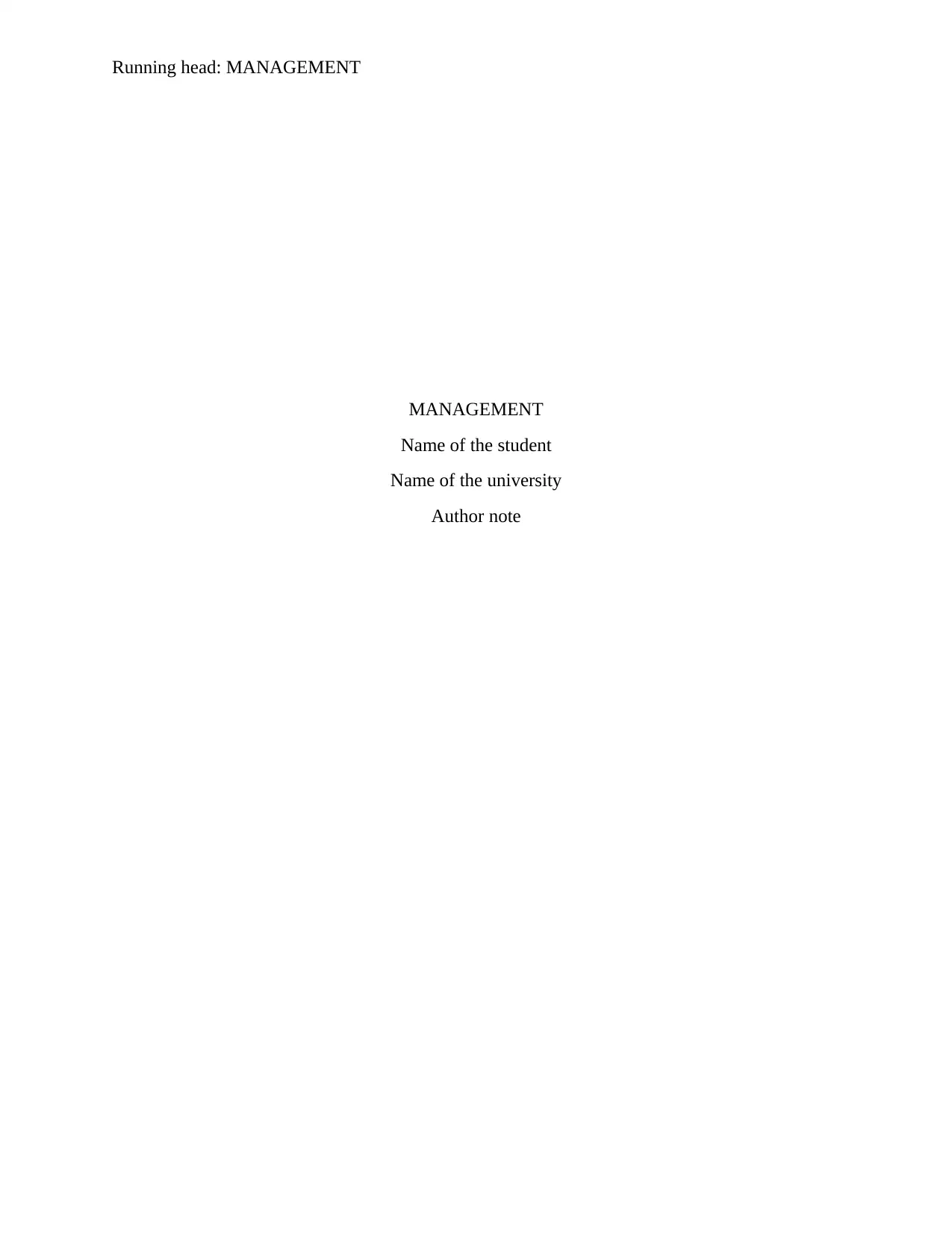
Running head: MANAGEMENT
MANAGEMENT
Name of the student
Name of the university
Author note
MANAGEMENT
Name of the student
Name of the university
Author note
Paraphrase This Document
Need a fresh take? Get an instant paraphrase of this document with our AI Paraphraser
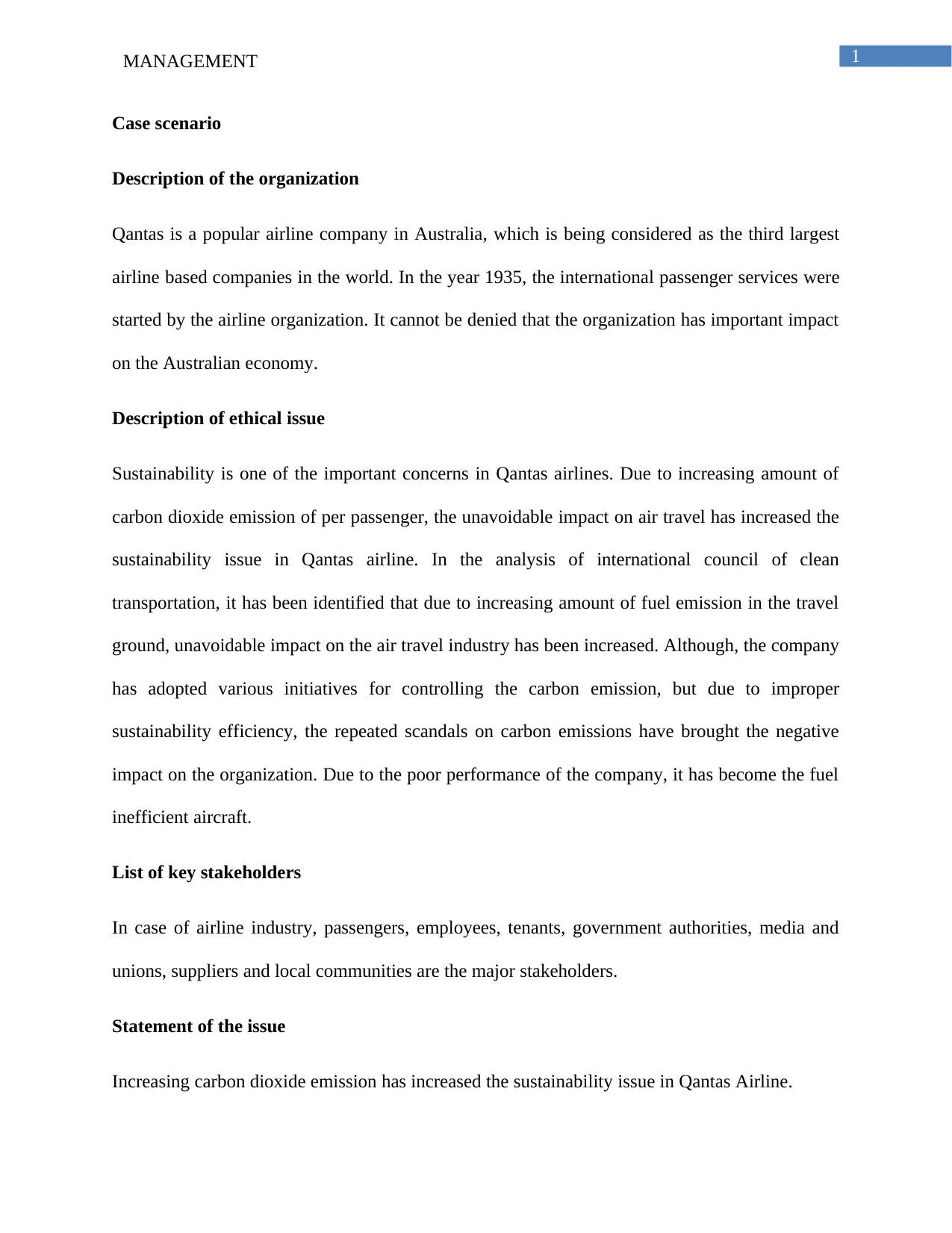
1MANAGEMENT
Case scenario
Description of the organization
Qantas is a popular airline company in Australia, which is being considered as the third largest
airline based companies in the world. In the year 1935, the international passenger services were
started by the airline organization. It cannot be denied that the organization has important impact
on the Australian economy.
Description of ethical issue
Sustainability is one of the important concerns in Qantas airlines. Due to increasing amount of
carbon dioxide emission of per passenger, the unavoidable impact on air travel has increased the
sustainability issue in Qantas airline. In the analysis of international council of clean
transportation, it has been identified that due to increasing amount of fuel emission in the travel
ground, unavoidable impact on the air travel industry has been increased. Although, the company
has adopted various initiatives for controlling the carbon emission, but due to improper
sustainability efficiency, the repeated scandals on carbon emissions have brought the negative
impact on the organization. Due to the poor performance of the company, it has become the fuel
inefficient aircraft.
List of key stakeholders
In case of airline industry, passengers, employees, tenants, government authorities, media and
unions, suppliers and local communities are the major stakeholders.
Statement of the issue
Increasing carbon dioxide emission has increased the sustainability issue in Qantas Airline.
Case scenario
Description of the organization
Qantas is a popular airline company in Australia, which is being considered as the third largest
airline based companies in the world. In the year 1935, the international passenger services were
started by the airline organization. It cannot be denied that the organization has important impact
on the Australian economy.
Description of ethical issue
Sustainability is one of the important concerns in Qantas airlines. Due to increasing amount of
carbon dioxide emission of per passenger, the unavoidable impact on air travel has increased the
sustainability issue in Qantas airline. In the analysis of international council of clean
transportation, it has been identified that due to increasing amount of fuel emission in the travel
ground, unavoidable impact on the air travel industry has been increased. Although, the company
has adopted various initiatives for controlling the carbon emission, but due to improper
sustainability efficiency, the repeated scandals on carbon emissions have brought the negative
impact on the organization. Due to the poor performance of the company, it has become the fuel
inefficient aircraft.
List of key stakeholders
In case of airline industry, passengers, employees, tenants, government authorities, media and
unions, suppliers and local communities are the major stakeholders.
Statement of the issue
Increasing carbon dioxide emission has increased the sustainability issue in Qantas Airline.
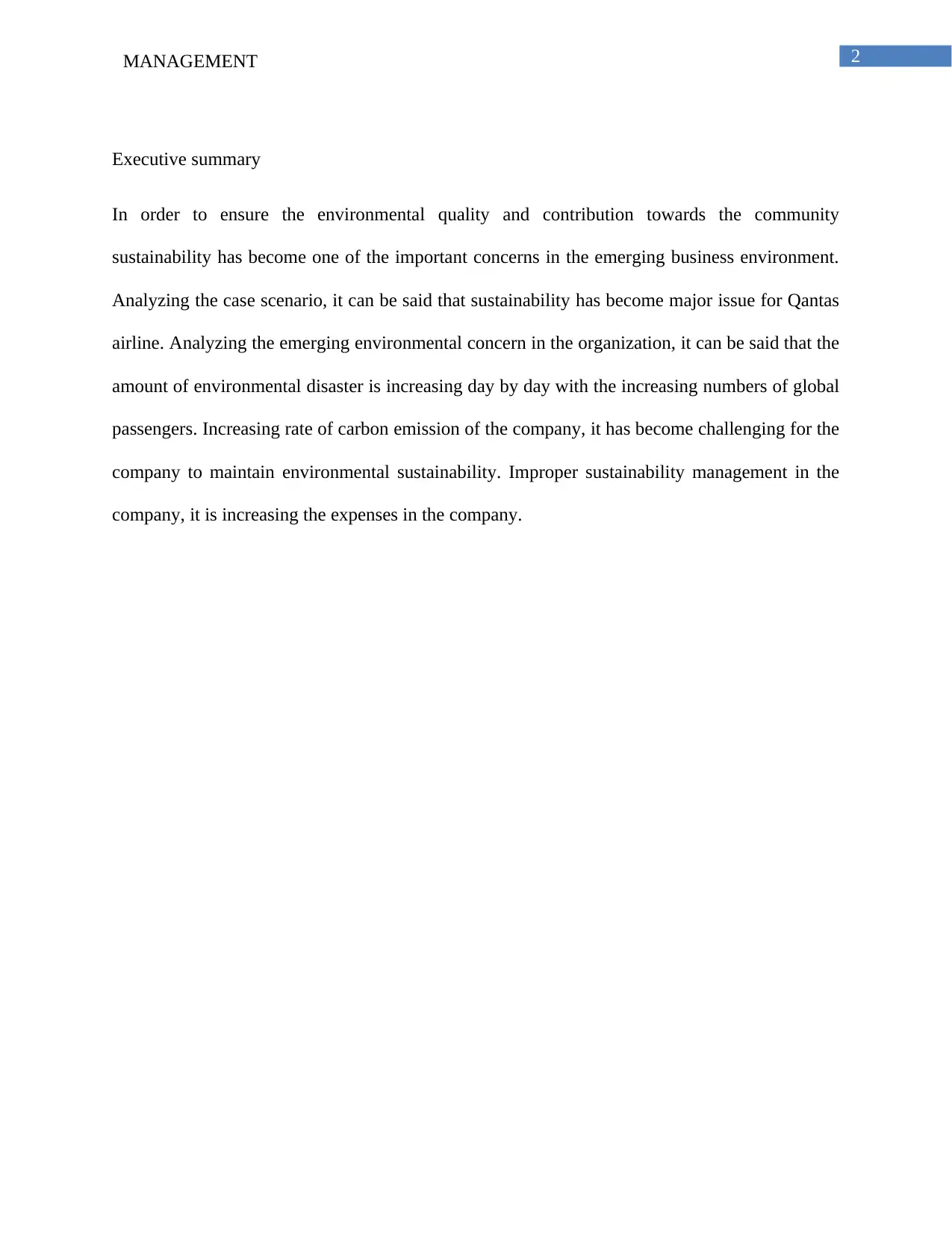
2MANAGEMENT
Executive summary
In order to ensure the environmental quality and contribution towards the community
sustainability has become one of the important concerns in the emerging business environment.
Analyzing the case scenario, it can be said that sustainability has become major issue for Qantas
airline. Analyzing the emerging environmental concern in the organization, it can be said that the
amount of environmental disaster is increasing day by day with the increasing numbers of global
passengers. Increasing rate of carbon emission of the company, it has become challenging for the
company to maintain environmental sustainability. Improper sustainability management in the
company, it is increasing the expenses in the company.
Executive summary
In order to ensure the environmental quality and contribution towards the community
sustainability has become one of the important concerns in the emerging business environment.
Analyzing the case scenario, it can be said that sustainability has become major issue for Qantas
airline. Analyzing the emerging environmental concern in the organization, it can be said that the
amount of environmental disaster is increasing day by day with the increasing numbers of global
passengers. Increasing rate of carbon emission of the company, it has become challenging for the
company to maintain environmental sustainability. Improper sustainability management in the
company, it is increasing the expenses in the company.
⊘ This is a preview!⊘
Do you want full access?
Subscribe today to unlock all pages.

Trusted by 1+ million students worldwide
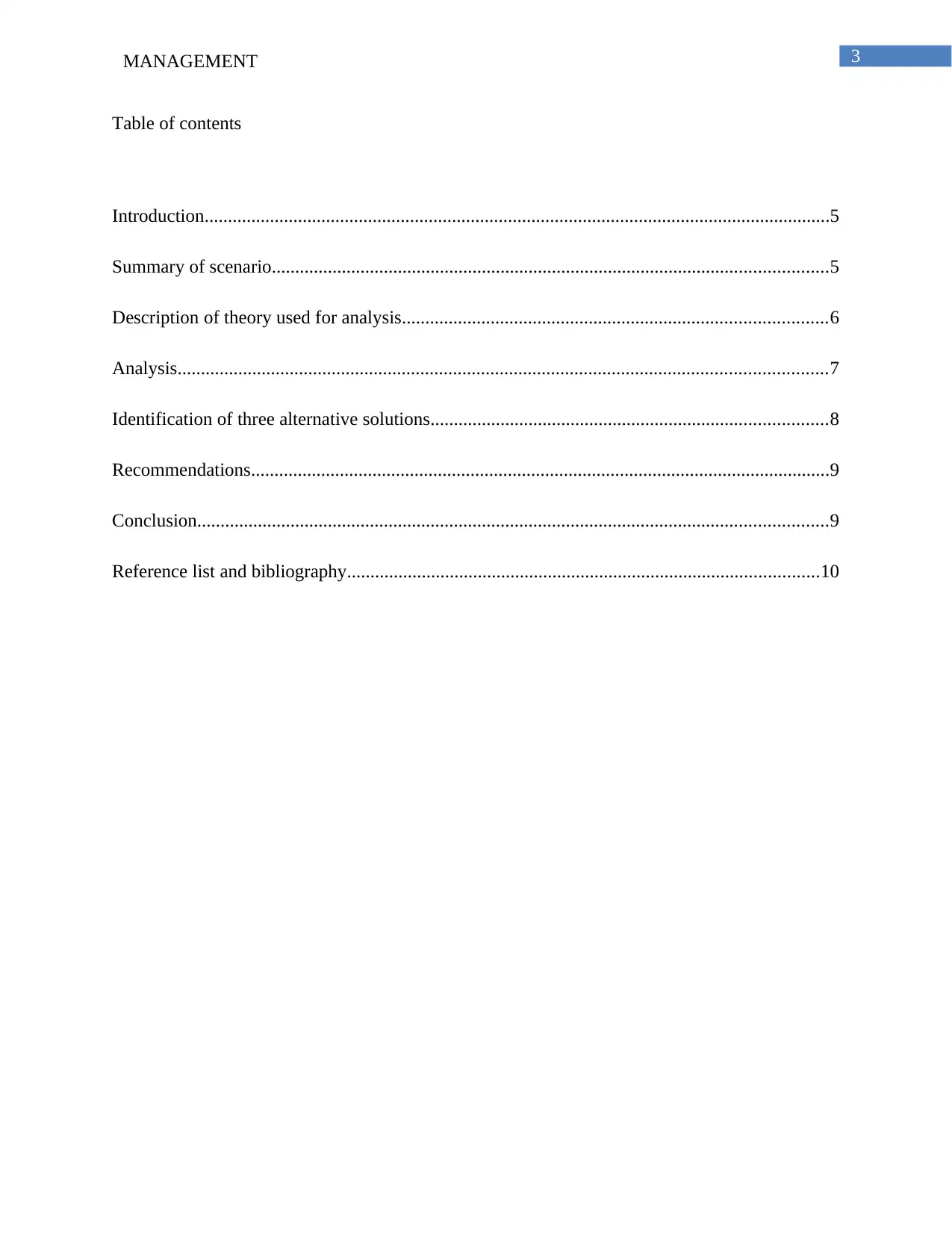
3MANAGEMENT
Table of contents
Introduction......................................................................................................................................5
Summary of scenario.......................................................................................................................5
Description of theory used for analysis...........................................................................................6
Analysis...........................................................................................................................................7
Identification of three alternative solutions.....................................................................................8
Recommendations............................................................................................................................9
Conclusion.......................................................................................................................................9
Reference list and bibliography.....................................................................................................10
Table of contents
Introduction......................................................................................................................................5
Summary of scenario.......................................................................................................................5
Description of theory used for analysis...........................................................................................6
Analysis...........................................................................................................................................7
Identification of three alternative solutions.....................................................................................8
Recommendations............................................................................................................................9
Conclusion.......................................................................................................................................9
Reference list and bibliography.....................................................................................................10
Paraphrase This Document
Need a fresh take? Get an instant paraphrase of this document with our AI Paraphraser
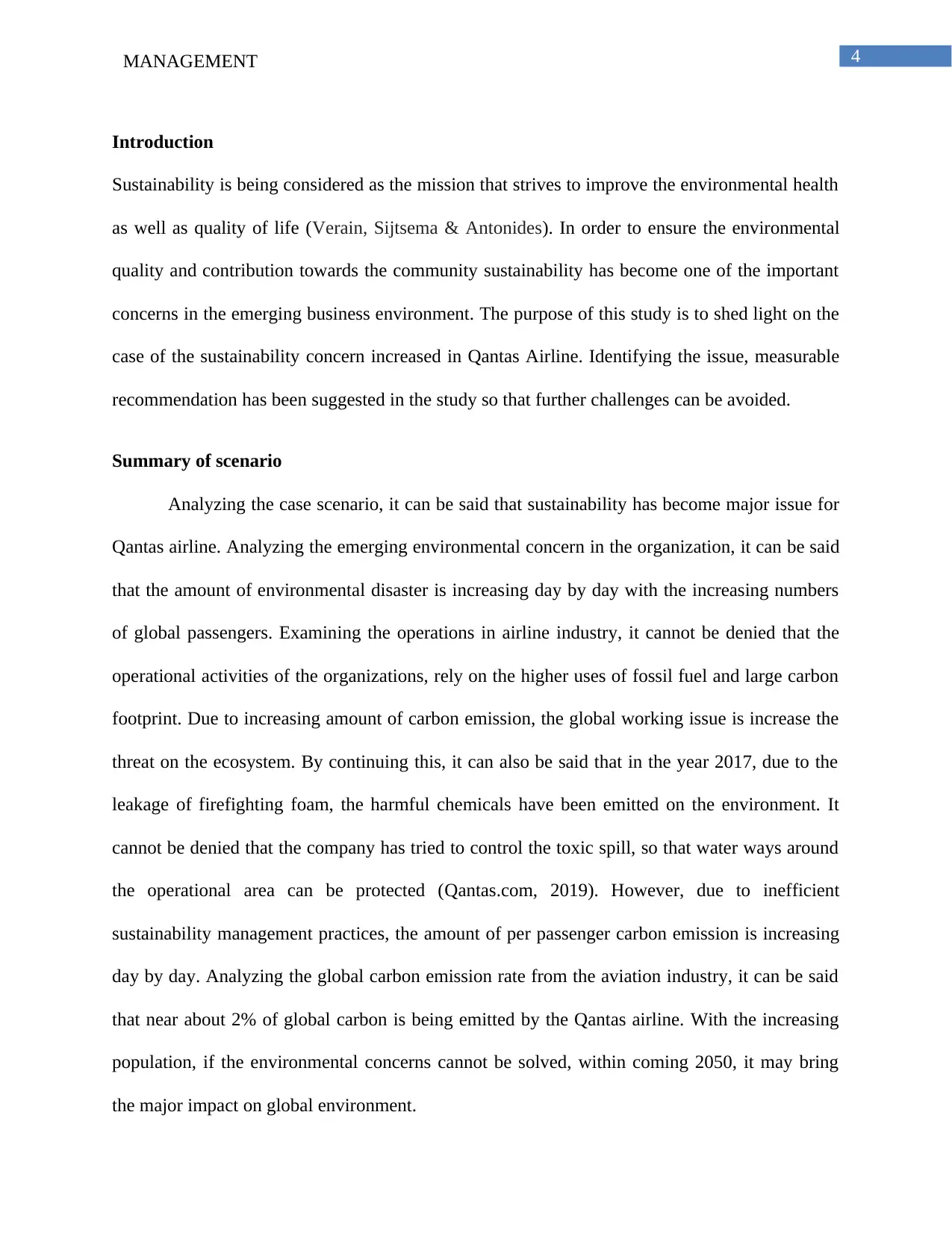
4MANAGEMENT
Introduction
Sustainability is being considered as the mission that strives to improve the environmental health
as well as quality of life (Verain, Sijtsema & Antonides). In order to ensure the environmental
quality and contribution towards the community sustainability has become one of the important
concerns in the emerging business environment. The purpose of this study is to shed light on the
case of the sustainability concern increased in Qantas Airline. Identifying the issue, measurable
recommendation has been suggested in the study so that further challenges can be avoided.
Summary of scenario
Analyzing the case scenario, it can be said that sustainability has become major issue for
Qantas airline. Analyzing the emerging environmental concern in the organization, it can be said
that the amount of environmental disaster is increasing day by day with the increasing numbers
of global passengers. Examining the operations in airline industry, it cannot be denied that the
operational activities of the organizations, rely on the higher uses of fossil fuel and large carbon
footprint. Due to increasing amount of carbon emission, the global working issue is increase the
threat on the ecosystem. By continuing this, it can also be said that in the year 2017, due to the
leakage of firefighting foam, the harmful chemicals have been emitted on the environment. It
cannot be denied that the company has tried to control the toxic spill, so that water ways around
the operational area can be protected (Qantas.com, 2019). However, due to inefficient
sustainability management practices, the amount of per passenger carbon emission is increasing
day by day. Analyzing the global carbon emission rate from the aviation industry, it can be said
that near about 2% of global carbon is being emitted by the Qantas airline. With the increasing
population, if the environmental concerns cannot be solved, within coming 2050, it may bring
the major impact on global environment.
Introduction
Sustainability is being considered as the mission that strives to improve the environmental health
as well as quality of life (Verain, Sijtsema & Antonides). In order to ensure the environmental
quality and contribution towards the community sustainability has become one of the important
concerns in the emerging business environment. The purpose of this study is to shed light on the
case of the sustainability concern increased in Qantas Airline. Identifying the issue, measurable
recommendation has been suggested in the study so that further challenges can be avoided.
Summary of scenario
Analyzing the case scenario, it can be said that sustainability has become major issue for
Qantas airline. Analyzing the emerging environmental concern in the organization, it can be said
that the amount of environmental disaster is increasing day by day with the increasing numbers
of global passengers. Examining the operations in airline industry, it cannot be denied that the
operational activities of the organizations, rely on the higher uses of fossil fuel and large carbon
footprint. Due to increasing amount of carbon emission, the global working issue is increase the
threat on the ecosystem. By continuing this, it can also be said that in the year 2017, due to the
leakage of firefighting foam, the harmful chemicals have been emitted on the environment. It
cannot be denied that the company has tried to control the toxic spill, so that water ways around
the operational area can be protected (Qantas.com, 2019). However, due to inefficient
sustainability management practices, the amount of per passenger carbon emission is increasing
day by day. Analyzing the global carbon emission rate from the aviation industry, it can be said
that near about 2% of global carbon is being emitted by the Qantas airline. With the increasing
population, if the environmental concerns cannot be solved, within coming 2050, it may bring
the major impact on global environment.
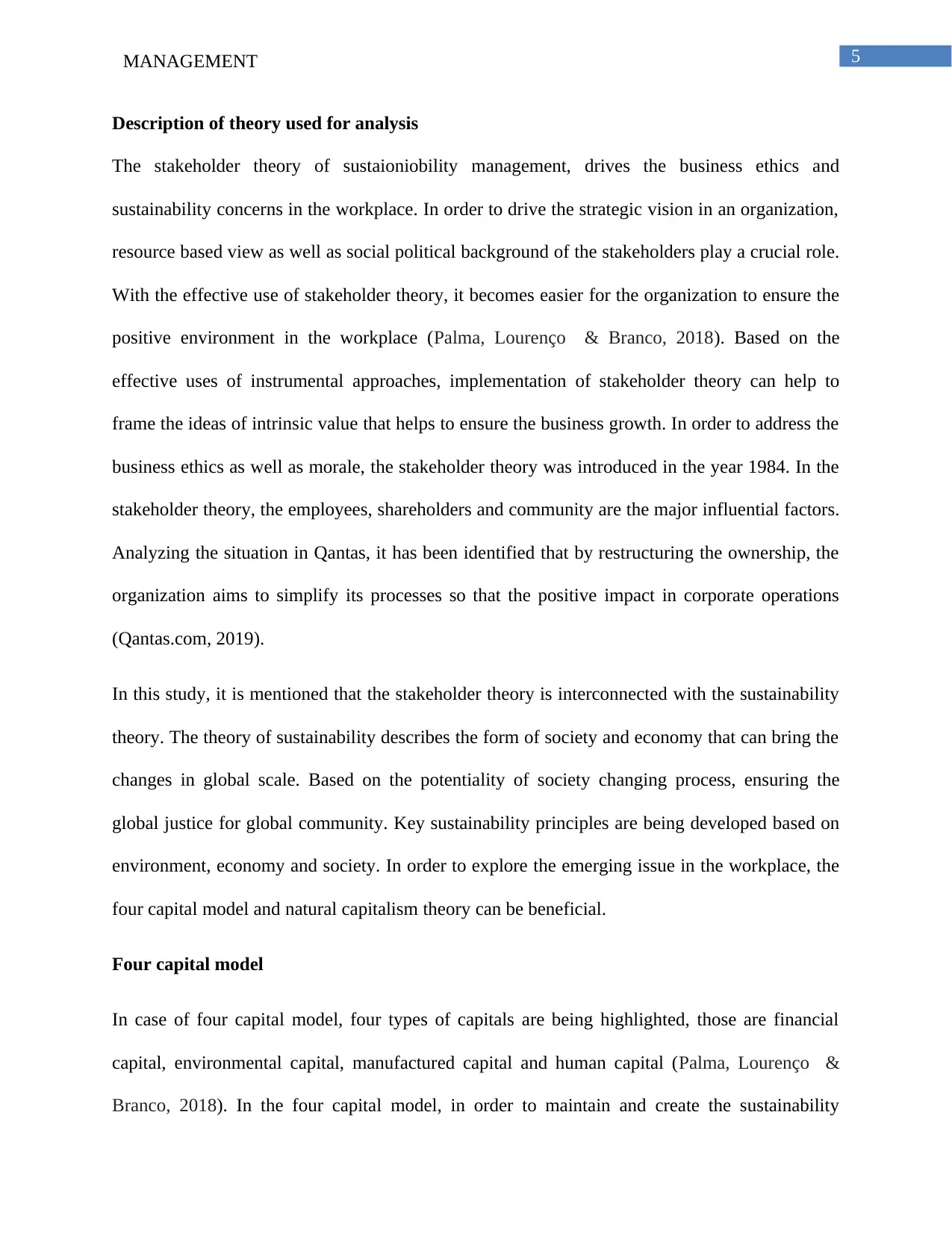
5MANAGEMENT
Description of theory used for analysis
The stakeholder theory of sustaioniobility management, drives the business ethics and
sustainability concerns in the workplace. In order to drive the strategic vision in an organization,
resource based view as well as social political background of the stakeholders play a crucial role.
With the effective use of stakeholder theory, it becomes easier for the organization to ensure the
positive environment in the workplace (Palma, Lourenço & Branco, 2018). Based on the
effective uses of instrumental approaches, implementation of stakeholder theory can help to
frame the ideas of intrinsic value that helps to ensure the business growth. In order to address the
business ethics as well as morale, the stakeholder theory was introduced in the year 1984. In the
stakeholder theory, the employees, shareholders and community are the major influential factors.
Analyzing the situation in Qantas, it has been identified that by restructuring the ownership, the
organization aims to simplify its processes so that the positive impact in corporate operations
(Qantas.com, 2019).
In this study, it is mentioned that the stakeholder theory is interconnected with the sustainability
theory. The theory of sustainability describes the form of society and economy that can bring the
changes in global scale. Based on the potentiality of society changing process, ensuring the
global justice for global community. Key sustainability principles are being developed based on
environment, economy and society. In order to explore the emerging issue in the workplace, the
four capital model and natural capitalism theory can be beneficial.
Four capital model
In case of four capital model, four types of capitals are being highlighted, those are financial
capital, environmental capital, manufactured capital and human capital (Palma, Lourenço &
Branco, 2018). In the four capital model, in order to maintain and create the sustainability
Description of theory used for analysis
The stakeholder theory of sustaioniobility management, drives the business ethics and
sustainability concerns in the workplace. In order to drive the strategic vision in an organization,
resource based view as well as social political background of the stakeholders play a crucial role.
With the effective use of stakeholder theory, it becomes easier for the organization to ensure the
positive environment in the workplace (Palma, Lourenço & Branco, 2018). Based on the
effective uses of instrumental approaches, implementation of stakeholder theory can help to
frame the ideas of intrinsic value that helps to ensure the business growth. In order to address the
business ethics as well as morale, the stakeholder theory was introduced in the year 1984. In the
stakeholder theory, the employees, shareholders and community are the major influential factors.
Analyzing the situation in Qantas, it has been identified that by restructuring the ownership, the
organization aims to simplify its processes so that the positive impact in corporate operations
(Qantas.com, 2019).
In this study, it is mentioned that the stakeholder theory is interconnected with the sustainability
theory. The theory of sustainability describes the form of society and economy that can bring the
changes in global scale. Based on the potentiality of society changing process, ensuring the
global justice for global community. Key sustainability principles are being developed based on
environment, economy and society. In order to explore the emerging issue in the workplace, the
four capital model and natural capitalism theory can be beneficial.
Four capital model
In case of four capital model, four types of capitals are being highlighted, those are financial
capital, environmental capital, manufactured capital and human capital (Palma, Lourenço &
Branco, 2018). In the four capital model, in order to maintain and create the sustainability
⊘ This is a preview!⊘
Do you want full access?
Subscribe today to unlock all pages.

Trusted by 1+ million students worldwide
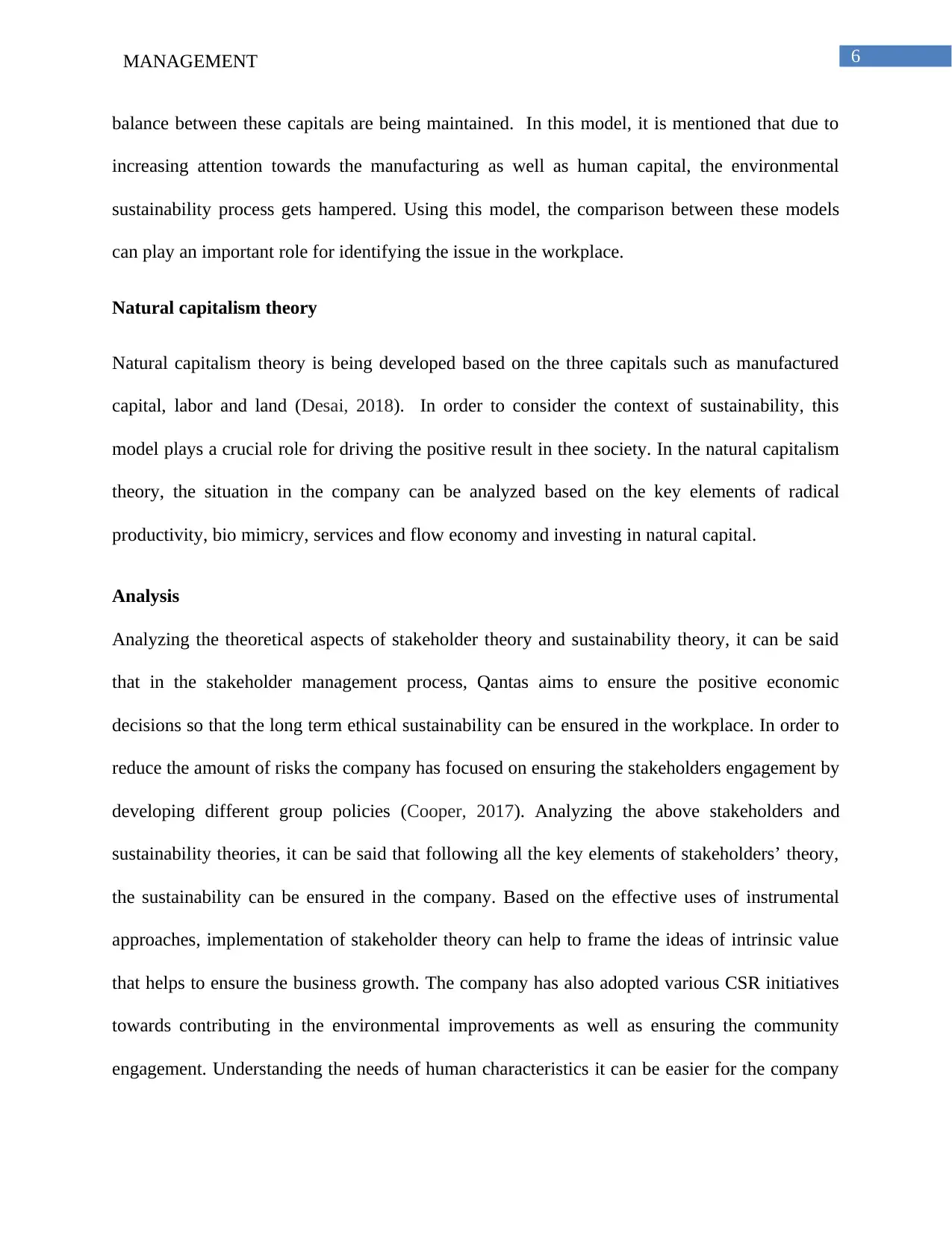
6MANAGEMENT
balance between these capitals are being maintained. In this model, it is mentioned that due to
increasing attention towards the manufacturing as well as human capital, the environmental
sustainability process gets hampered. Using this model, the comparison between these models
can play an important role for identifying the issue in the workplace.
Natural capitalism theory
Natural capitalism theory is being developed based on the three capitals such as manufactured
capital, labor and land (Desai, 2018). In order to consider the context of sustainability, this
model plays a crucial role for driving the positive result in thee society. In the natural capitalism
theory, the situation in the company can be analyzed based on the key elements of radical
productivity, bio mimicry, services and flow economy and investing in natural capital.
Analysis
Analyzing the theoretical aspects of stakeholder theory and sustainability theory, it can be said
that in the stakeholder management process, Qantas aims to ensure the positive economic
decisions so that the long term ethical sustainability can be ensured in the workplace. In order to
reduce the amount of risks the company has focused on ensuring the stakeholders engagement by
developing different group policies (Cooper, 2017). Analyzing the above stakeholders and
sustainability theories, it can be said that following all the key elements of stakeholders’ theory,
the sustainability can be ensured in the company. Based on the effective uses of instrumental
approaches, implementation of stakeholder theory can help to frame the ideas of intrinsic value
that helps to ensure the business growth. The company has also adopted various CSR initiatives
towards contributing in the environmental improvements as well as ensuring the community
engagement. Understanding the needs of human characteristics it can be easier for the company
balance between these capitals are being maintained. In this model, it is mentioned that due to
increasing attention towards the manufacturing as well as human capital, the environmental
sustainability process gets hampered. Using this model, the comparison between these models
can play an important role for identifying the issue in the workplace.
Natural capitalism theory
Natural capitalism theory is being developed based on the three capitals such as manufactured
capital, labor and land (Desai, 2018). In order to consider the context of sustainability, this
model plays a crucial role for driving the positive result in thee society. In the natural capitalism
theory, the situation in the company can be analyzed based on the key elements of radical
productivity, bio mimicry, services and flow economy and investing in natural capital.
Analysis
Analyzing the theoretical aspects of stakeholder theory and sustainability theory, it can be said
that in the stakeholder management process, Qantas aims to ensure the positive economic
decisions so that the long term ethical sustainability can be ensured in the workplace. In order to
reduce the amount of risks the company has focused on ensuring the stakeholders engagement by
developing different group policies (Cooper, 2017). Analyzing the above stakeholders and
sustainability theories, it can be said that following all the key elements of stakeholders’ theory,
the sustainability can be ensured in the company. Based on the effective uses of instrumental
approaches, implementation of stakeholder theory can help to frame the ideas of intrinsic value
that helps to ensure the business growth. The company has also adopted various CSR initiatives
towards contributing in the environmental improvements as well as ensuring the community
engagement. Understanding the needs of human characteristics it can be easier for the company
Paraphrase This Document
Need a fresh take? Get an instant paraphrase of this document with our AI Paraphraser
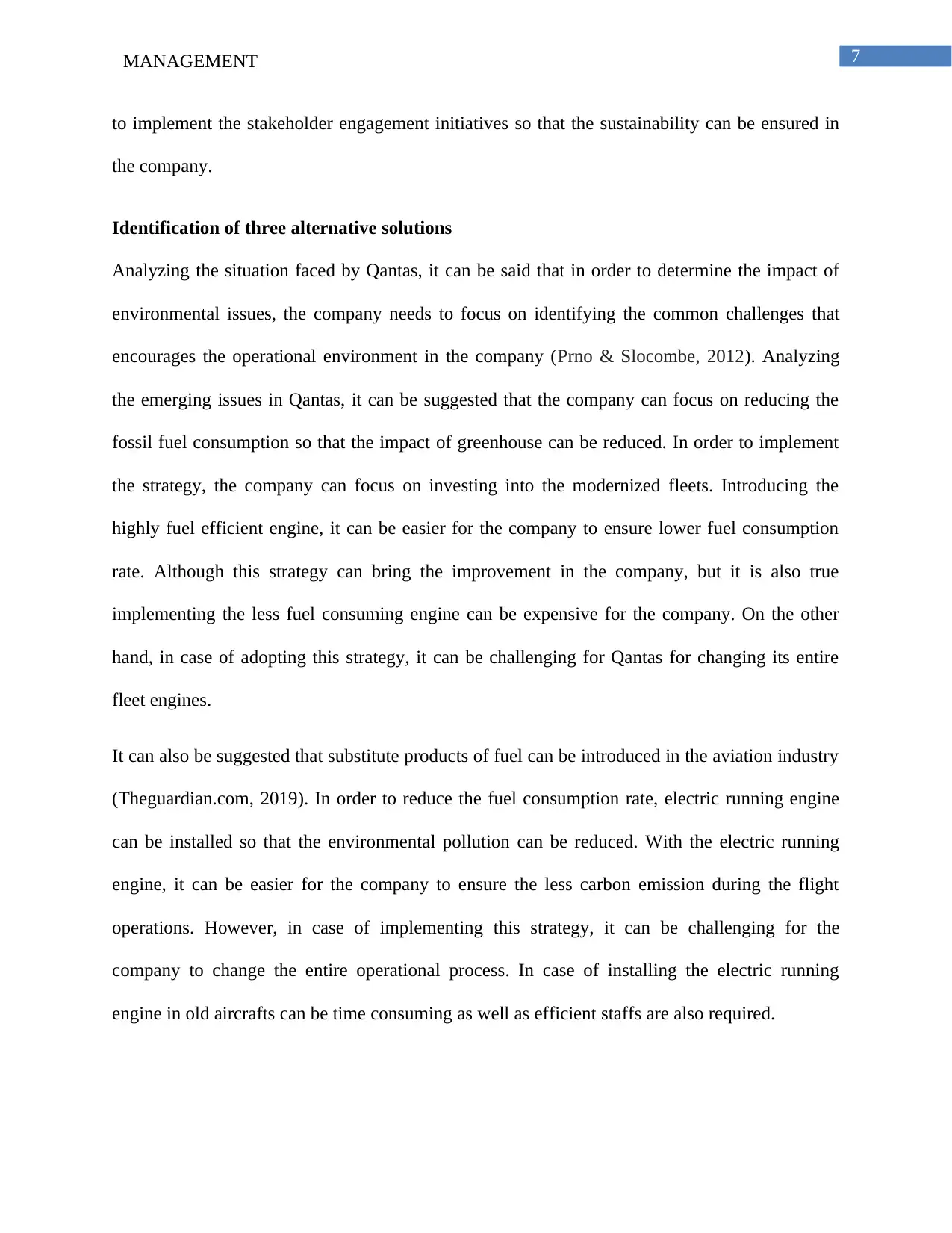
7MANAGEMENT
to implement the stakeholder engagement initiatives so that the sustainability can be ensured in
the company.
Identification of three alternative solutions
Analyzing the situation faced by Qantas, it can be said that in order to determine the impact of
environmental issues, the company needs to focus on identifying the common challenges that
encourages the operational environment in the company (Prno & Slocombe, 2012). Analyzing
the emerging issues in Qantas, it can be suggested that the company can focus on reducing the
fossil fuel consumption so that the impact of greenhouse can be reduced. In order to implement
the strategy, the company can focus on investing into the modernized fleets. Introducing the
highly fuel efficient engine, it can be easier for the company to ensure lower fuel consumption
rate. Although this strategy can bring the improvement in the company, but it is also true
implementing the less fuel consuming engine can be expensive for the company. On the other
hand, in case of adopting this strategy, it can be challenging for Qantas for changing its entire
fleet engines.
It can also be suggested that substitute products of fuel can be introduced in the aviation industry
(Theguardian.com, 2019). In order to reduce the fuel consumption rate, electric running engine
can be installed so that the environmental pollution can be reduced. With the electric running
engine, it can be easier for the company to ensure the less carbon emission during the flight
operations. However, in case of implementing this strategy, it can be challenging for the
company to change the entire operational process. In case of installing the electric running
engine in old aircrafts can be time consuming as well as efficient staffs are also required.
to implement the stakeholder engagement initiatives so that the sustainability can be ensured in
the company.
Identification of three alternative solutions
Analyzing the situation faced by Qantas, it can be said that in order to determine the impact of
environmental issues, the company needs to focus on identifying the common challenges that
encourages the operational environment in the company (Prno & Slocombe, 2012). Analyzing
the emerging issues in Qantas, it can be suggested that the company can focus on reducing the
fossil fuel consumption so that the impact of greenhouse can be reduced. In order to implement
the strategy, the company can focus on investing into the modernized fleets. Introducing the
highly fuel efficient engine, it can be easier for the company to ensure lower fuel consumption
rate. Although this strategy can bring the improvement in the company, but it is also true
implementing the less fuel consuming engine can be expensive for the company. On the other
hand, in case of adopting this strategy, it can be challenging for Qantas for changing its entire
fleet engines.
It can also be suggested that substitute products of fuel can be introduced in the aviation industry
(Theguardian.com, 2019). In order to reduce the fuel consumption rate, electric running engine
can be installed so that the environmental pollution can be reduced. With the electric running
engine, it can be easier for the company to ensure the less carbon emission during the flight
operations. However, in case of implementing this strategy, it can be challenging for the
company to change the entire operational process. In case of installing the electric running
engine in old aircrafts can be time consuming as well as efficient staffs are also required.
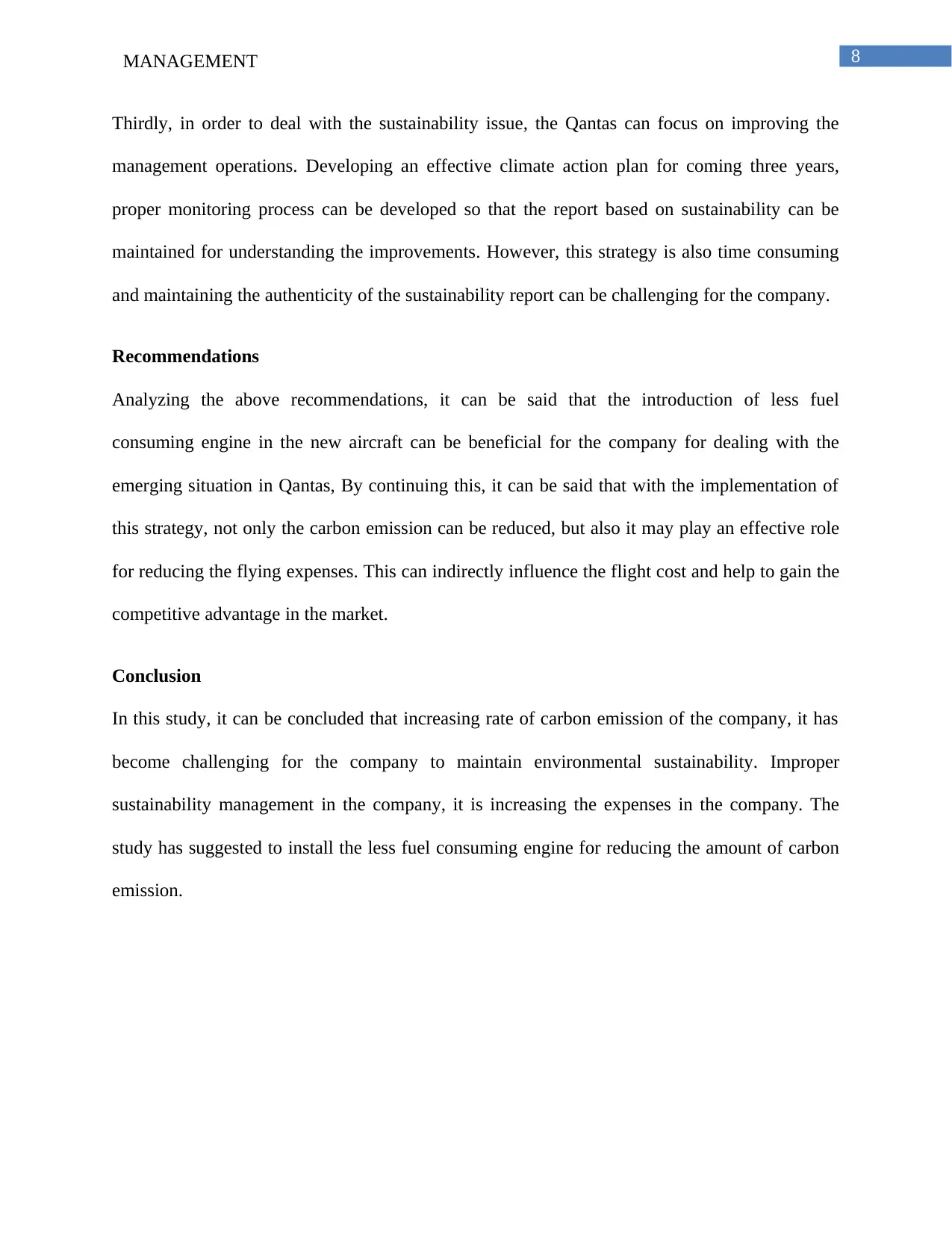
8MANAGEMENT
Thirdly, in order to deal with the sustainability issue, the Qantas can focus on improving the
management operations. Developing an effective climate action plan for coming three years,
proper monitoring process can be developed so that the report based on sustainability can be
maintained for understanding the improvements. However, this strategy is also time consuming
and maintaining the authenticity of the sustainability report can be challenging for the company.
Recommendations
Analyzing the above recommendations, it can be said that the introduction of less fuel
consuming engine in the new aircraft can be beneficial for the company for dealing with the
emerging situation in Qantas, By continuing this, it can be said that with the implementation of
this strategy, not only the carbon emission can be reduced, but also it may play an effective role
for reducing the flying expenses. This can indirectly influence the flight cost and help to gain the
competitive advantage in the market.
Conclusion
In this study, it can be concluded that increasing rate of carbon emission of the company, it has
become challenging for the company to maintain environmental sustainability. Improper
sustainability management in the company, it is increasing the expenses in the company. The
study has suggested to install the less fuel consuming engine for reducing the amount of carbon
emission.
Thirdly, in order to deal with the sustainability issue, the Qantas can focus on improving the
management operations. Developing an effective climate action plan for coming three years,
proper monitoring process can be developed so that the report based on sustainability can be
maintained for understanding the improvements. However, this strategy is also time consuming
and maintaining the authenticity of the sustainability report can be challenging for the company.
Recommendations
Analyzing the above recommendations, it can be said that the introduction of less fuel
consuming engine in the new aircraft can be beneficial for the company for dealing with the
emerging situation in Qantas, By continuing this, it can be said that with the implementation of
this strategy, not only the carbon emission can be reduced, but also it may play an effective role
for reducing the flying expenses. This can indirectly influence the flight cost and help to gain the
competitive advantage in the market.
Conclusion
In this study, it can be concluded that increasing rate of carbon emission of the company, it has
become challenging for the company to maintain environmental sustainability. Improper
sustainability management in the company, it is increasing the expenses in the company. The
study has suggested to install the less fuel consuming engine for reducing the amount of carbon
emission.
⊘ This is a preview!⊘
Do you want full access?
Subscribe today to unlock all pages.

Trusted by 1+ million students worldwide
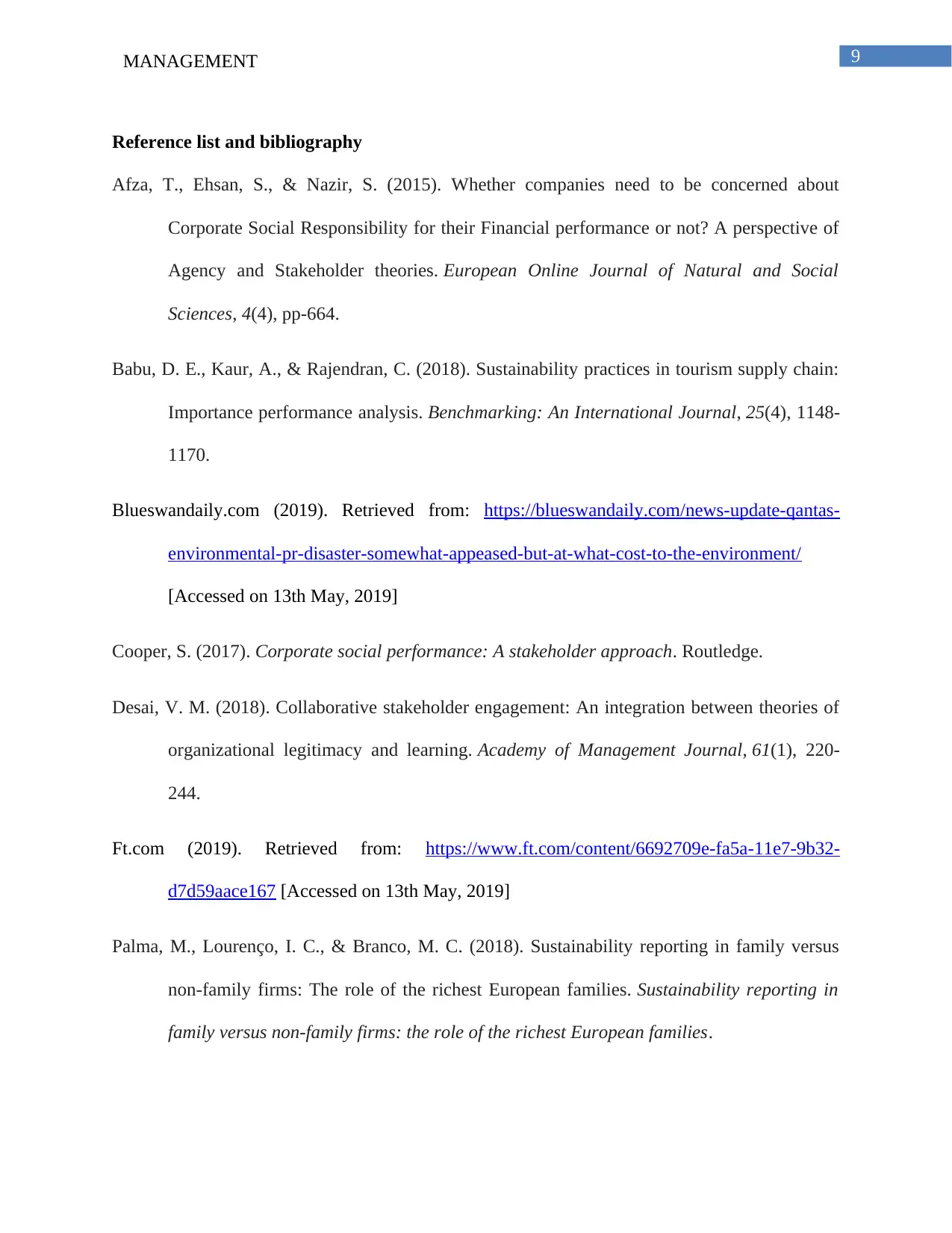
9MANAGEMENT
Reference list and bibliography
Afza, T., Ehsan, S., & Nazir, S. (2015). Whether companies need to be concerned about
Corporate Social Responsibility for their Financial performance or not? A perspective of
Agency and Stakeholder theories. European Online Journal of Natural and Social
Sciences, 4(4), pp-664.
Babu, D. E., Kaur, A., & Rajendran, C. (2018). Sustainability practices in tourism supply chain:
Importance performance analysis. Benchmarking: An International Journal, 25(4), 1148-
1170.
Blueswandaily.com (2019). Retrieved from: https://blueswandaily.com/news-update-qantas-
environmental-pr-disaster-somewhat-appeased-but-at-what-cost-to-the-environment/
[Accessed on 13th May, 2019]
Cooper, S. (2017). Corporate social performance: A stakeholder approach. Routledge.
Desai, V. M. (2018). Collaborative stakeholder engagement: An integration between theories of
organizational legitimacy and learning. Academy of Management Journal, 61(1), 220-
244.
Ft.com (2019). Retrieved from: https://www.ft.com/content/6692709e-fa5a-11e7-9b32-
d7d59aace167 [Accessed on 13th May, 2019]
Palma, M., Lourenço, I. C., & Branco, M. C. (2018). Sustainability reporting in family versus
non-family firms: The role of the richest European families. Sustainability reporting in
family versus non-family firms: the role of the richest European families.
Reference list and bibliography
Afza, T., Ehsan, S., & Nazir, S. (2015). Whether companies need to be concerned about
Corporate Social Responsibility for their Financial performance or not? A perspective of
Agency and Stakeholder theories. European Online Journal of Natural and Social
Sciences, 4(4), pp-664.
Babu, D. E., Kaur, A., & Rajendran, C. (2018). Sustainability practices in tourism supply chain:
Importance performance analysis. Benchmarking: An International Journal, 25(4), 1148-
1170.
Blueswandaily.com (2019). Retrieved from: https://blueswandaily.com/news-update-qantas-
environmental-pr-disaster-somewhat-appeased-but-at-what-cost-to-the-environment/
[Accessed on 13th May, 2019]
Cooper, S. (2017). Corporate social performance: A stakeholder approach. Routledge.
Desai, V. M. (2018). Collaborative stakeholder engagement: An integration between theories of
organizational legitimacy and learning. Academy of Management Journal, 61(1), 220-
244.
Ft.com (2019). Retrieved from: https://www.ft.com/content/6692709e-fa5a-11e7-9b32-
d7d59aace167 [Accessed on 13th May, 2019]
Palma, M., Lourenço, I. C., & Branco, M. C. (2018). Sustainability reporting in family versus
non-family firms: The role of the richest European families. Sustainability reporting in
family versus non-family firms: the role of the richest European families.
Paraphrase This Document
Need a fresh take? Get an instant paraphrase of this document with our AI Paraphraser
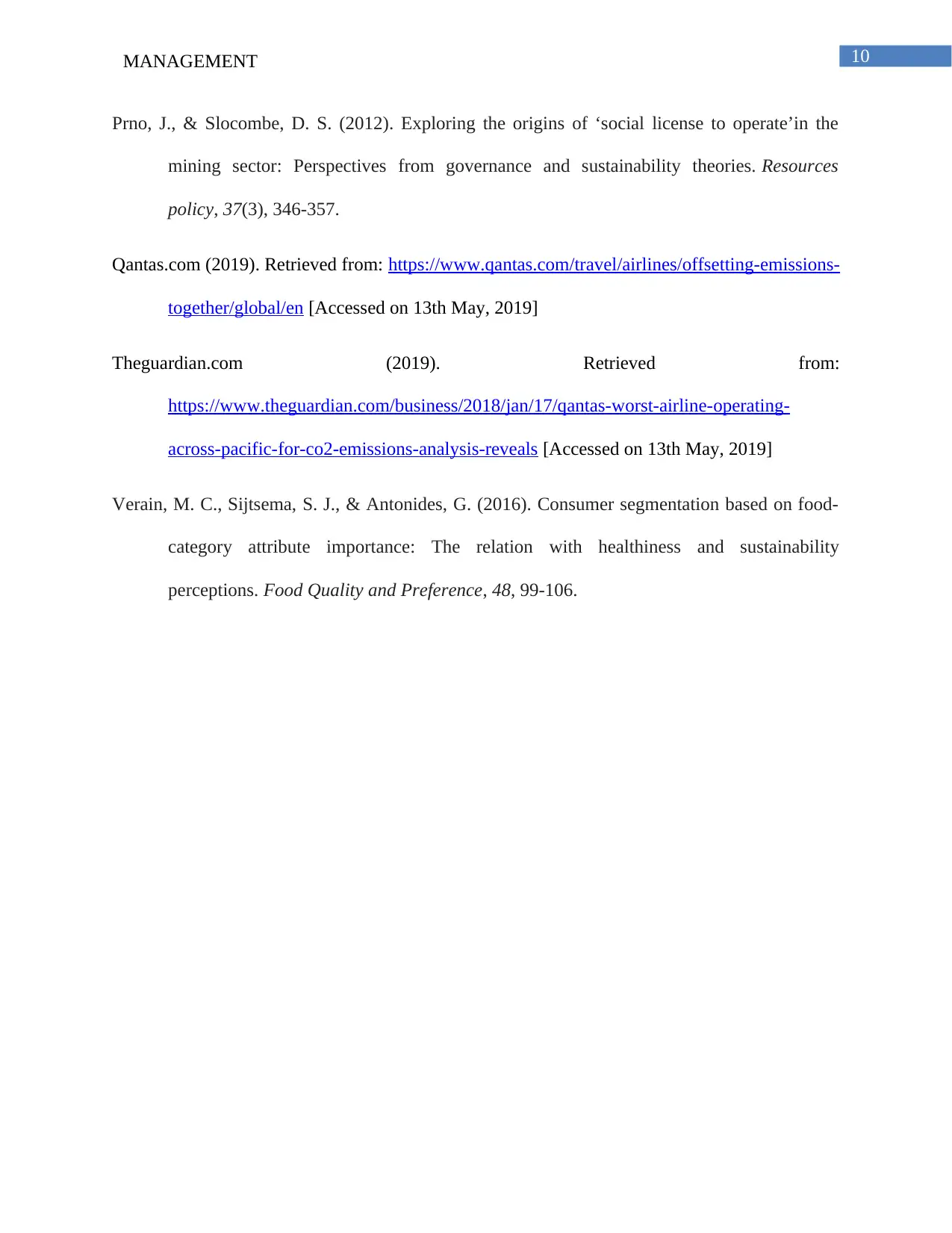
10MANAGEMENT
Prno, J., & Slocombe, D. S. (2012). Exploring the origins of ‘social license to operate’in the
mining sector: Perspectives from governance and sustainability theories. Resources
policy, 37(3), 346-357.
Qantas.com (2019). Retrieved from: https://www.qantas.com/travel/airlines/offsetting-emissions-
together/global/en [Accessed on 13th May, 2019]
Theguardian.com (2019). Retrieved from:
https://www.theguardian.com/business/2018/jan/17/qantas-worst-airline-operating-
across-pacific-for-co2-emissions-analysis-reveals [Accessed on 13th May, 2019]
Verain, M. C., Sijtsema, S. J., & Antonides, G. (2016). Consumer segmentation based on food-
category attribute importance: The relation with healthiness and sustainability
perceptions. Food Quality and Preference, 48, 99-106.
Prno, J., & Slocombe, D. S. (2012). Exploring the origins of ‘social license to operate’in the
mining sector: Perspectives from governance and sustainability theories. Resources
policy, 37(3), 346-357.
Qantas.com (2019). Retrieved from: https://www.qantas.com/travel/airlines/offsetting-emissions-
together/global/en [Accessed on 13th May, 2019]
Theguardian.com (2019). Retrieved from:
https://www.theguardian.com/business/2018/jan/17/qantas-worst-airline-operating-
across-pacific-for-co2-emissions-analysis-reveals [Accessed on 13th May, 2019]
Verain, M. C., Sijtsema, S. J., & Antonides, G. (2016). Consumer segmentation based on food-
category attribute importance: The relation with healthiness and sustainability
perceptions. Food Quality and Preference, 48, 99-106.
1 out of 11
Related Documents
Your All-in-One AI-Powered Toolkit for Academic Success.
+13062052269
info@desklib.com
Available 24*7 on WhatsApp / Email
![[object Object]](/_next/static/media/star-bottom.7253800d.svg)
Unlock your academic potential
Copyright © 2020–2026 A2Z Services. All Rights Reserved. Developed and managed by ZUCOL.





